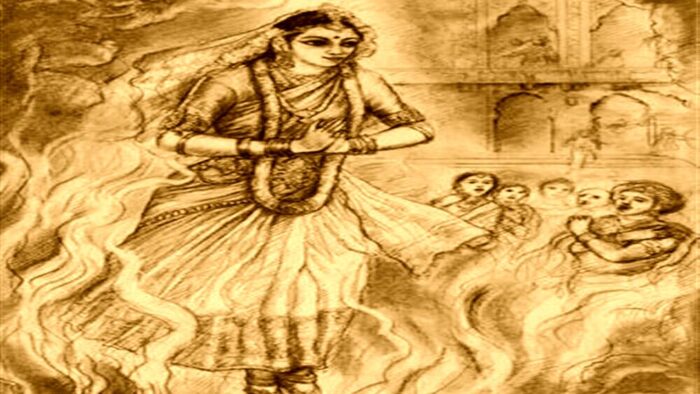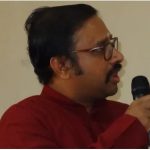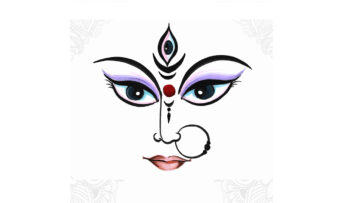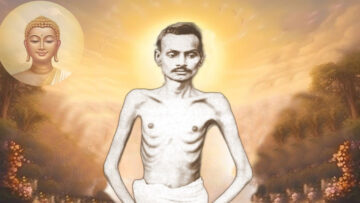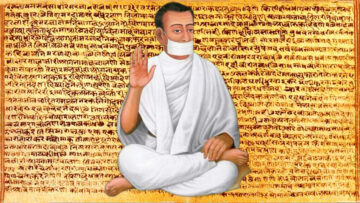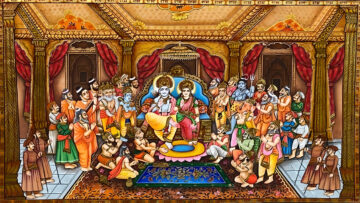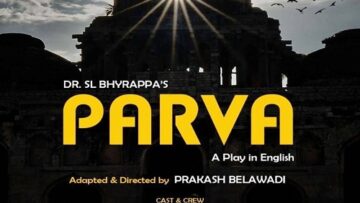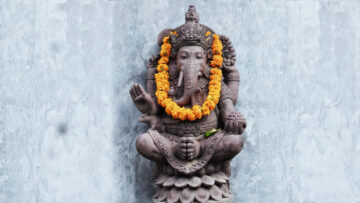The Adi Parva of Mahabharata is full of stories that define the philosophical terrain on which the rest of Mahabharata grows and elaborates. Though each of these stories seems to be merely ornamenting the main story of Kaurava-Pandavas each of them is a gem of fascinating metaphors.
Apart from artistically ornamenting, they provide a metaphysical dimension to the main story, bringing forth the philosophical Drishti of our Rishis. They throw light on the pitfalls of human nature and how different universal principles (Tatvas) shape a certain future in this interplay between the two. The birth of Draupadi is one such story.
At the Ekachakranagara, after Bheema kills Baka, a brahmin arrives and narrates the fascinating story of the birth of Draupadi and Dhristhadyumna. A widely traveled brahmin – he narrates his experiences and knowledge about various regions, rivers, parvatas, teertha-kshetras, kings, languages, and life of different communities.
Finally, he narrates the story of the birth of the Draupadi from the yagna-kunda. This catches the attention of the Pandavas and they seek an elaborate narration of everything around her birth.
Dronacharya was born to Sage Bharadwaja in a divine pot after his chance stumbling upon the Apsara Ghritachi. He became friends with Drupada in the ashrama of Bharadvaja. After the death of King Prishata, his son Drupada became the king.
Drona on the other hand went in search of wealth to Sage Parashurama. Instead of his wealth, Dronacharya received his weapons as Parashurama had no wealth to share by then and only weapons. Drona was quite pleased with this unexpected wealth but his real need was material wealth. He reached out to his friend Drupada from his Ashrama days.
However, Drupada insulted him. The King thought that only a King was equal to another and could seek friendship. A furious Drona came back without seeking wealth. Subsequently, he reached Hastinapur. Pandavas knew the rest of the story.
They had secured a victory for Drona and half of Drupada’s Panchala – that too his ancestral part – the Northern Panchala. Drupada was left with his Southern Panchala which was only annexed to the Northern through a campaign a few generations earlier. Pandavas were keen to know Drupada’s subsequent life leading to the birth of Draupadi.
Drupada had merely accepted Drona’s friendship in words. But his mind was seeking revenge. He turned lean and pale by the day. He knew that Drona could not be defeated in a straight battle. Drona’s superiority in every dimension was evident. None of his children and others in his ecosystem were equal to Dronacharya.
Drupada decided that he must invoke divinity through yagna-yaga in order to achieve his goals. He went in search of an Atharva priest of capability who could perform such a yagna that could secure him a victory against Dronacharya. The Acharya was a great combination of the divine grace of Brahma & Kshatra. Drupada with his weak Tapas and limited Kshatra was not a match even to the Pandavas, let alone Dronacharya.
With his arrogance, Drupada had brought upon himself enormous insult and humiliation. Now, in his inability to swallow it, he was seeking to further it in ways and means that were way beyond his control.
Finally, he found two sages of the Kashyapa gotra – Yaaja and Upayaaja were performing penance on the banks of River Ganga. They were great Brahmarshis, with immense Tapas and prowess in the Atharva methods.
They had the ability to instrument material benefits through Yagna. Drupada praised them, served them for a while and sought their help. He learnt that Upayaaja was of greater prowess than Yaaja and met him in private.
After many rounds of seva, Drupada put forth his ambition in front of Upayaaja. However, Upayaaja straightly refused to entertain Drupada’s request saying he was not in the practice of performing such Athava yagnas. They were considered as coming in the way of seeking Moksha – the ultimate aim of the Bharateeya Parampara.
The King, of course, did not have the courage to seek an explanation or force his end. He continued his seva of Upayaaja hoping that one fine day he may change his heart and mind. Such a day indeed came but in an altogether different form. Upayaaja narrated an old incident. One day Yaaja and Upayaaja were travelling inside a forest and a fruit fell from the tree.
Yaaja immediately consumed it without investigating whether the fruit was worthy of eating by a sage. Where from the tree did it fall? Where did it fall? Was the place according to the shoucha principles of a sage? Why did the fruit fall at all – was it out of natural causes or somebody had forced a fall?
A sage, performing a Vrata, is not supposed to eat anything and everything that comes one’s way. One who cannot distinguish the worthiness of a fruit, will not have the faculty to determine the purity and impurity of any other matter. Even in the Ashrama, as disciples seeking knowledge, Yaaja did not have qualms about eating ucchishTa – food that others had tasted. Naturally, worldly pleasures mattered to him a lot more.
Upayaaja thought that Yaaja was more likely to agree to serve Drupada’s ambition and that he must seek his brother’s mediation for the Yagna. Drupada though was not keen but without any other option he reached out to Yaaja.
As expected Yaaja agreed. As he wondered about everything that was needed to perform the Yagna, Yaaja realized that he needed the support of his brother Upayaaja to successfully perform the Yagna as it was quite complex. Upayaaja consented. He presented a list of equipment that was needed and assured Drupada that a great son would be born to him – one with valour, grace and power – as Drupada sought.
The great yagna started. As it reached the Poornaahuti – the final offering – Yaaja invited the queen of Drupada to receive the ‘havis’ to beget desired fruits. Drupada’s wife had miscalculated the time. She did not expect the moment to arrive that early. She needed to perform a bath after having eaten food (her lips still laden with the spices of post-food) and smeared scent for pleasure. She sought a little time but was flatly denied by Yaaja.
In a tough tone he quipped “Maharani, the time has arrived. Either you receive the ‘havis’ or I am capable of fulfilling Drupada’s wishes in ways that do not require you receiving this ‘havis’”. The queen did not step forward – not wanting to violate long standing traditions.
Yaaja offered the very ‘havis’ reserved for the queen, back to Yagneshwara himself. At once, a young man of immense grace, with a beautiful crown on his head, with bow, arrow and sword in his hands – came out of the yagna fire. In great haste, he rode a divine chariot and went for a campaign letting out immense lion roars.
People of the Panchala kingdom cried ‘Sadhu, Sadhu’ in happiness. Mother earth, on the other hand, immensely felt the weight of her people that day. A voice from the sky declared that this young man would be the cause of Drona’s end and bring immense fame to Panchala Kingdom. It assured that Drupada will lose his fear and concern by his very presence.
Even as everybody was wonderstruck by the young man, a young lady came out of the yagna-kunda. Dark in colour, with broad eyes and curly hair – she was filled with beauty that one mistook her for a Devata. Her grace could be felt many yojana-s away from the yagna-kunda. Yet another invisible voice declared “She is Krishnaa.
This beautiful lady shall be deemed as the greatest lady of her times. She will be responsible for the destruction of Kshatriyas. Apart from fulfilling her divine responsibilities, she will be the reason for many dangers to the Kings of Kuruvamsha. Yet again – people of the Panchala Kingdom rejoiced. Yet again – Bhoomi devi struggled to hold the weight of her children.
Drupada’s wife sought a blessing from the sages that the two must consider only her as their mother and none else. The Sages graced her request to come true. The young man was named Dhrishtadyumna and the young lady Krishnaa. Being the daughter of Drupada – she also came to be known as Draupadi.
Sooner than later Dronacharya learnt of the developments. He realized that his actions had resulted in consequences beyond his wish. He submitted himself to the wishes of the divine. Knowing fully well that Dhrishtadyumna was the chosen one to bring his end, Dronacharya chose to perform his deeksha as a guru teaching Kshatriyas and accepted Dhrishtadyumna as his disciple. Dhristadyumna acquired Dhanurvidya from Dronacharya.
Nothing is incidental in Mahabharata. It seems as though Dronacharya stumbles upon Parashurama. Dronacharya needed material wealth. He may have sought that from anywhere. However, he learns that Parashurama is sharing material wealth acquired from Kshatriyas. A Brahamana is allowed Bhiksha from anywhere and more so another Brahmana.
Dronacharya goes to Parusharama only for that purpose. However, he is elated to receive divine weapons and ways of using them – the Astras. Dronacharya receives them without the usual penance that is part of a Gurukula, although he has learnt Shastra Vidya from his father as well and is capable of wielding them.
Yet, Dronacharya receives something that he did not seek through the penance of a Gurukula. That has its consequences. An action that is beyond one’s complete ability to perform has consequences beyond one’s wishes. Thus, every action of Drona after this had stretched consequences.
That seems to have played on his mind when Drupada insulted him. Almost immediately, Dronacharya seems to have invoked it by getting into an ego battle with Drupada. A brahmana should have simply forgiven or ignored Drupada. In any case, he could not have sought a direct revenge on his account of being a Brahmana. He seeks it indirectly through his Shishyas.
More importantly, a part of the legacy of Parashurama – destruction of Kshastriyas – now lies with Dronacharya, waiting to be invoked. The seeds of large scale destruction have been sown. Thankfully, divinity turns it towards the purpose of restoration of Dharma.
Drupada knows that he is giving into his ego. Yet he lacks the penance to withdraw himself from it. He knows that what he seeks is not valued highly in the tradition. He has to fulfill his desire of vengeance only from a sage well versed in the material yagna – not greatly respected.
Thankfully his search ends up with the right Sages. Although both Yaaja-Upayaaja are well versed with Atharva yagna-s, their personal orientations are very different. Both have grown up and learnt in the same ecosystem (much like Paravasu-Aravasu – sons of Sage Raibhya) but the former is more inclined towards the material and the latter is a sage with focus on higher ideals.
Yaaja willing to eat any fruit that has fallen anywhere by any means is a great metaphor. A fruit signifies an outcome of natural means. Results of natural phenomenon too ought to be distinguished into the good and the bad. Everything in Nature is not worthy of receiving, accepting and consuming.
Srishti leads to both the good and the bad. However, the sage, the brahmana ought to have the ability to make that distinction between what furthers the cause of Dharma and what does not. If one is in a haste to consume everything that is produced in nature, then one furthers the cause of Adharma that results from an impure creation.
Yaaja lacks that distinction but Upayaaja has that in a good measure and more. Hence, Upayaaja is not inclined to lead the efforts in this Yagna.
Thankfully, Drupada himself knows that Upayaaja is the greater sage. He also knows that his desire has an impurity in it and hopes that Upayaaja’s presence will nullify that impurity. He is unable to overcome his own desire but is not willing to bear a dangerous fruit as a result.
It is this thought that saves the day for Drupada. His learning at the feet of Sage Bharadvaja has borne some fruit. On the other hand, Yaaja, more than willing to perform the yagna, realizes that creating somebody who can stand-upto Dronacharya requires a greater collective penance. He needs his younger brother Upayaaja as well.
It is a great metaphor that the material orientation of Yaaja and the Saatvik orientation of Upayaaja are both required to perform the feat. A yagna of Yaaja alone would have created a greater destructive force.
The presence of Upayaaja results in a more divine outcome. Upayaaja too knows that such material ambition requires the instrumentation of Yaaja, but he could elevate it from the mundane to the sublime.
This is akin to what happens in the Samudra-Manthana when Mahavishnu convinces the Devatas that they require the Raksha power to perform the churning of the ocean.
Divinity takes over the project from here. Drupada’s disastrous revenge seeking finds a Yaaja. But his innate nature to seek greater glory, he is after-all a Panchala King in the tradition of Divodasa, Pratardana, Sudasa, Somaka, Sahadeva, results in him finding the Upayaaja – one who can transform the actions of Yaaja into the Divine.
For a desire to be fulfilled you need the instrument of a Yaaja. But for that to result in a greater good, you need a Upayaaja. The Yagnas will result in what they are made for. However, where the fruits of the Yagna falls decide whether they result in the good or the bad.
The Divinity takes over the situation and turns the weapons of Dronacharya and desire of Drupada into an annihilation of the Kshatriya kula to restore Dharma.
The desire for a Drishtadyumna results in the birth of Draupadi. Drishtadyumna was needed only to destroy Dronacharya. The latter’s weapons were required to destroy an entire Kshatriyakula. Draupadi, on the other hand, was required to hasten this process as well as restore Dharma itself.
For that, Draupadi must marry the Pandavas. That is the divine purpose. That is the result of the presence of Sage Upayaaja. Great men, by their presence and by their penance, allow Divinity to express itself through them.
Featured Image Credits: backtogodhead
Disclaimer: The opinions expressed in this article belong to the author. Indic Today is neither responsible nor liable for the accuracy, completeness, suitability, or validity of any information in the article.

